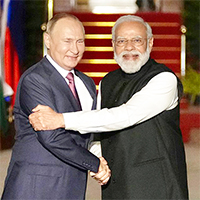In defense of India’s Foreign Policy in the midst of the Ukrainian Crisis
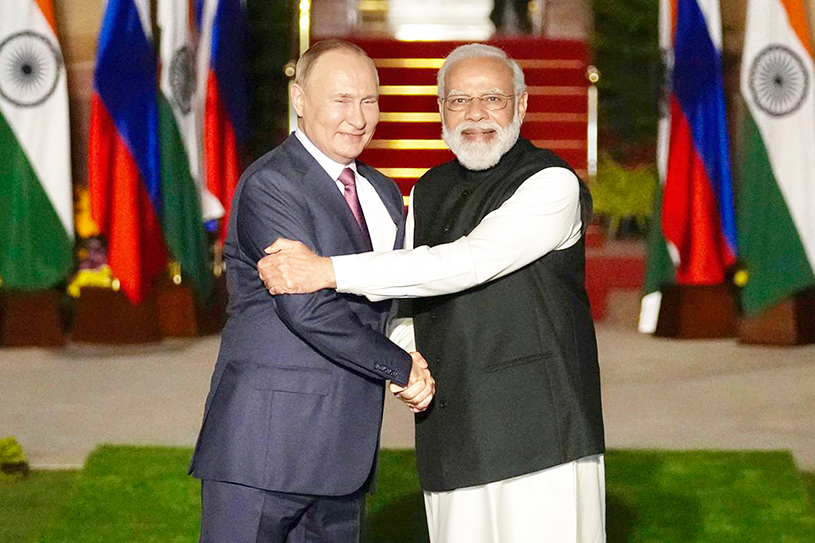
By Amrit Hallan
There has been quite a brouhaha in the West, especially in the US, regarding India’s strategic silence over what is happening between Russia and Ukraine. The Modi government hasn’t openly called it an invasion. It isn’t participating in the onslaught of sanctions that the NATO countries and the US vessels are imposing on Russia. In a recent White House statement, President Biden has termed India’s response as “somewhat shaky” while praising Quad and NATO countries.
There is a long list of reasons for India’s refusal to vote in favor of a UN resolution condemning Russia for its invasion of Ukraine. This has been a sign of India’s historical friendship since India’s Independence. India’s dependence on Russian weapons is not the only reason why India has refused to condemn Russia. India’s stand is based on accurate calculations.
To the further vexation of the West, India is importing crude oil from Russia in greater quantities and at discounted rates, and both the countries are also talking about trading in rupees rather than dollars.
Historically, India and Russia have been close allies. Whereas the rest of the world has stood on Pakistan’s side on many vital issues, Russia has vetoed UNSC resolutions over Kashmir to keep it a bilateral issue which has been India’s long-lasting stand. Similarly, when China infiltrated Ladakh, except the counted countries like Russia, most of the western countries remained silent.
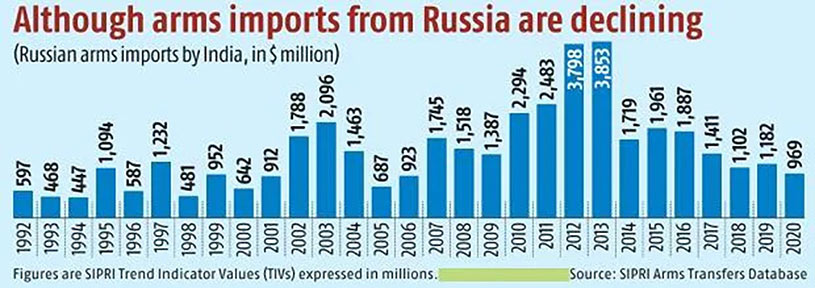
The USA hasn’t exactly been friendly to India’s interests in the past. During the historic Indo-Pakistani War in which Bangladesh was freed from the maniacal Pakistani army, the US committed the blunder of sending the Seventh Fleet’s Task Force 74, a warship laden with the nuclear-powered aircraft carrier Enterprise, towards the Bay of Bengal. This move was to provide strategic support to the Pakistani military. More than 100,000 Pakistani soldiers were trapped between the Indian Army and the Bay of Bengal. Despite her faults, Indira Gandhi, then Prime Minister of India, had the foresight to sign an Indo-Soviet Friendship Treaty just before mounting an attack on East Pakistan. In response to the US adventure in the Bay of Bengal, Russia dispatched a submarine armed with nuclear warheads, which forced the US fleet to back down.
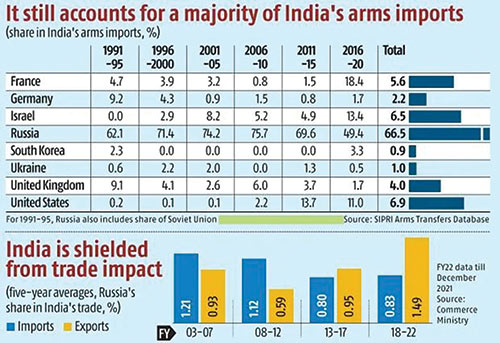 The US has had a long history of imposing sanctions against India. India’s entire cryogenic technology was allegedly sabotaged by the CIA in collusion with the UPA government of that time although the investigations are still going on. Recently, after creating a mess in the war-ravaged country, the US government has handed over Afghanistan to the Taliban-Pakistan alliance, causing further strategic problems for India. Similarly, in 1998, Ukraine had condemned India’s nuclear tests and supported sanctions against India,
The US has had a long history of imposing sanctions against India. India’s entire cryogenic technology was allegedly sabotaged by the CIA in collusion with the UPA government of that time although the investigations are still going on. Recently, after creating a mess in the war-ravaged country, the US government has handed over Afghanistan to the Taliban-Pakistan alliance, causing further strategic problems for India. Similarly, in 1998, Ukraine had condemned India’s nuclear tests and supported sanctions against India,
Russia is also India’s biggest arms supplier. India is building BrahMos supersonic cruise missiles with Russia. In December 2021, Narendra Modi and Vladimir Putin signed a litany of trade and arms deals. This also includes a 10-year military and technical cooperation program under which the Indian government will manufacture nearly half a million Kalashnikov assault rifles for Russia.
 India also sees Russia as a counter force against China. Presently China and historically Russia have been communist countries and, consequently, much closer and accommodating to each other. Just like India, China, too, has shown a guarded stand in the wake of the Russia-Ukraine conflict. In the case of a direct conflict between India and China, India sees Russia as a potent intermediary.
India also sees Russia as a counter force against China. Presently China and historically Russia have been communist countries and, consequently, much closer and accommodating to each other. Just like India, China, too, has shown a guarded stand in the wake of the Russia-Ukraine conflict. In the case of a direct conflict between India and China, India sees Russia as a potent intermediary.
India’s stand is also guarded because many in the world believe that Russia has been pushed against the wall and has been forced to carry out “special military operations” to prevent it from falling into NATO’s arms. It has been Russia’s contention for many years that the US is trying to surround it from all sides by taking all the small countries, especially countries that belong to the former USSR, into NATO’s fold. It isn’t about natural resources. It isn’t about oil. It is about strategic interests in the future safety of Russia.
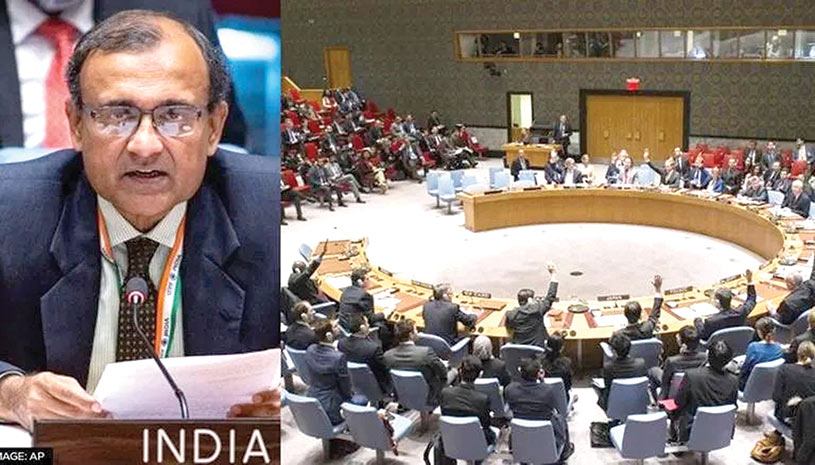
In this vein, one of the accusations made by Russia is that Ukraine has been overrun by Neo-Nazis. These traits have been visible during the current conflict. While India’s evacuation of its students and citizens from Ukraine is being hailed the world over, there have been reports of attempts to hold Indian civilians hostage back in Ukraine because India has not condemned Russia. Draconian measures such as firing gunshots in the air, beating people with batons, and ramming cars and vans into groups of students are reported to have been used to instill fear among the students.
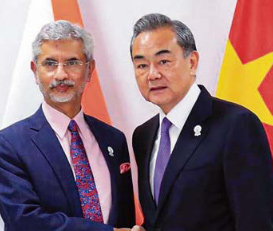 In a recent press conference, India’s Foreign Minister Subrahmanyam Jaishankar said, “The situation in Ukraine is the result of a complex chain of circumstances over the last thirty years. Most countries, such as India and France, which are very active, are seeking a diplomatic solution.”
In a recent press conference, India’s Foreign Minister Subrahmanyam Jaishankar said, “The situation in Ukraine is the result of a complex chain of circumstances over the last thirty years. Most countries, such as India and France, which are very active, are seeking a diplomatic solution.”
When asked why India has not condemned Russia in the current conflict, Jaishankar added, “The real question is: are you mobilized to find a good solution or are you content with posturing? India can talk with Russia, with other countries within the UN security council and support initiatives like those of France.”
India has had no part in the current conflict. India didn’t instigate the war. It has no interest in taking strategic or political sides. India has condemned violence. So far, it has refused to join the hysterical mob being led by the US. It is a sign of strength that India is guarding its own interests rather than giving in to pressure.
About the Author
Amrit Hallan is a writer learning the ropes and trying to remain true to what he believes in. As a writer he has no problem being politically incorrect. He likes being praised for his writing, but not at the cost of what he believes in. Although he is a professional writer, his true calling is literary and journalistic writing.

